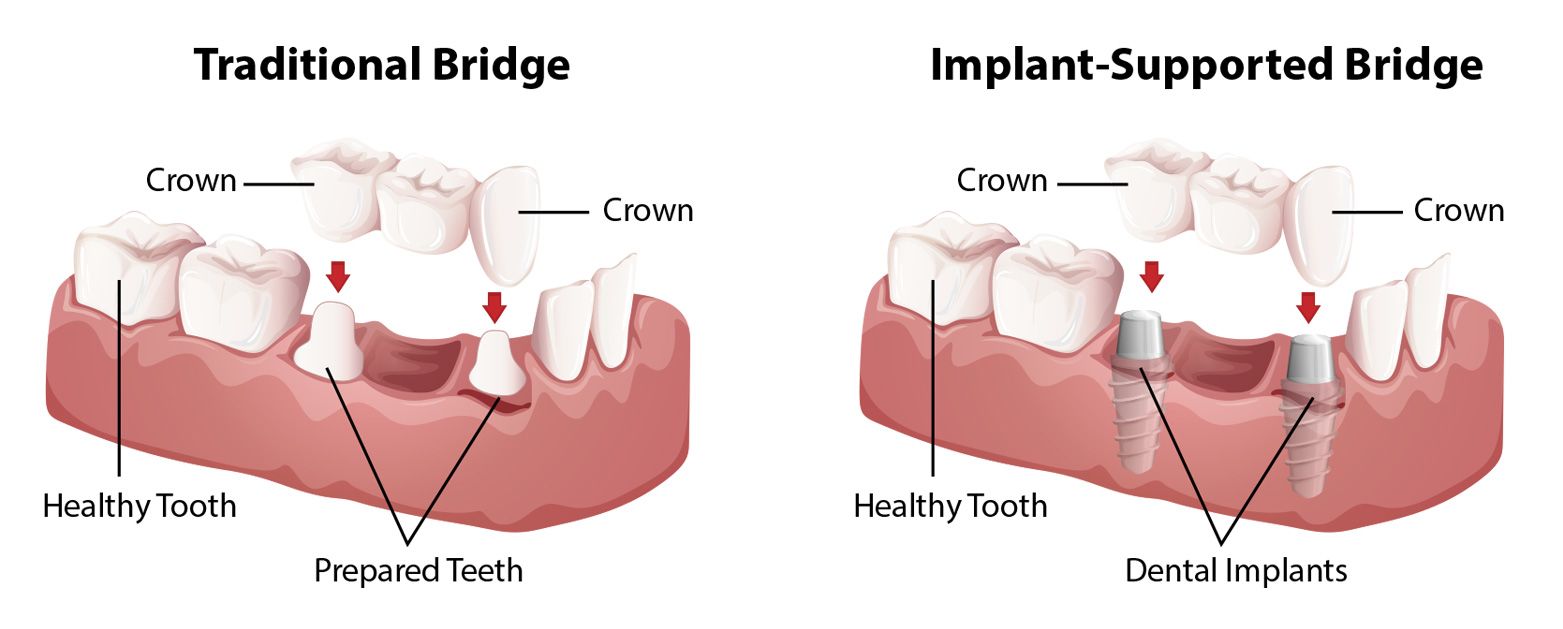Deciding between Traditional vs. Implant-supported Dental Bridges
Traditional vs. Implant-supported Dental Bridges
 Tooth loss can make eating difficult. If you suffer from one or more missing teeth, dental bridges may be right for you. Dental bridges are a time-tested solution to replacing missing teeth for restored dental function and appearance. There are options when it comes to dental bridge treatment. In this blog post, we will focus on traditional versus implant-supported bridges and the benefits of each. To learn more, contact our Woodinville, WA dentists Cristin Dowd and Ken Wu.
Tooth loss can make eating difficult. If you suffer from one or more missing teeth, dental bridges may be right for you. Dental bridges are a time-tested solution to replacing missing teeth for restored dental function and appearance. There are options when it comes to dental bridge treatment. In this blog post, we will focus on traditional versus implant-supported bridges and the benefits of each. To learn more, contact our Woodinville, WA dentists Cristin Dowd and Ken Wu.
What Are Traditional Bridges?
Traditional dental bridges are a popular choice among patients wishing to replace one or more missing teeth. Traditional dental bridges consist of two dental crowns joined by one or more artificial teeth, called pontics. Traditional dental bridges are held in place by attaching the dental crowns to the two nearest remaining teeth.
Traditional bridges require there to be two teeth adjacent to the gap left by the missing teeth. These two teeth must be healthy enough to support the dental bridge and will be prepared by removing a small amount of enamel. This helps make room for the crowns to fit over the teeth when the bridge is cemented in place.
The Benefits of Traditional Bridges
Traditional dental bridges offer many benefits to those who suffer from tooth loss. Some of the benefits include:
- No surgery required: Traditional bridges do not require surgery for placement, making them suitable for those who are not healthy enough for surgery or simply do not want to undergo surgery to restore their missing teeth.
- Restored dental function: Traditional bridges replace missing teeth, helping to restore dental function and improve comfort while biting and chewing.
- Improved appearance: Traditional bridges can enhance the smile by replacing lost teeth.
- Faster than receiving an implant-supported bridge: Because surgery is not required, there is no recovery time needed before placing a traditional bridge. This allows faster replacement of missing teeth.
What Are Implant-supported Bridges?
Implant-supported bridges may also be used to replace one or more missing teeth. Like traditional dental bridges, implant-supported bridges consist of one or more artificial teeth. Unlike traditional dental bridges, the restoration is attached to dental implants instead of the natural teeth.
In order to place the dental implants to support the bridge, minor surgery must be performed and the jawbone must heal around the implant to form a secure bond before the implant-supported bridge may be attached. It can take several months for the jaw to sufficiently heal around the implants. However, once healing is complete, a permanent bond will form, providing a secure base for the implant-supported bridge to attach within the mouth.
The Benefits of Implant-supported Bridges
Although the process for implant-supported bridges takes longer than treatment with traditional bridges, there are many benefits of implant-supported bridges, such as:
- Anchors firmly within the mouth: Implant-supported bridges anchor firmly within the mouth thanks to the strong bond formed between the jawbone and implant.
- Can restore multiple missing teeth: Those who are missing too many teeth to qualify for a traditional bridge may make suitable candidates for an implant-supported bridge.
- Restored dental function: As with traditional bridges, implant-supported bridges help restore dental function by replacing multiple missing teeth.
- Enhanced appearance: Implant-supported bridges help improve and enhance the smile by replacing multiple teeth with a single restoration.
Which Treatment Is Right For You?
Both traditional bridges and implant-supported bridges can improve quality of life by restoring dental function. To find out which treatment is right for you, you're encouraged to schedule a consultation with Drs. Dowd and Wu.

